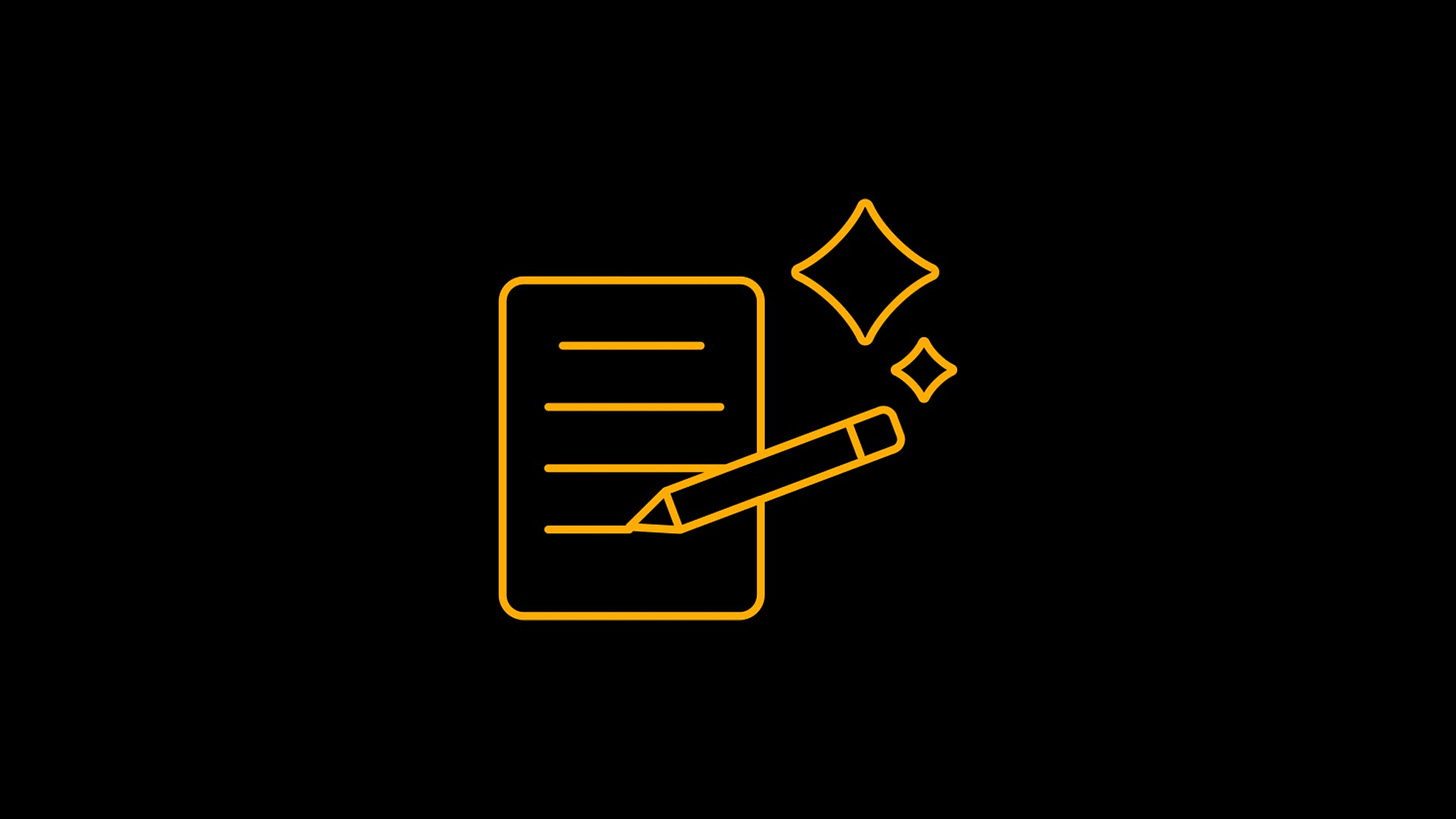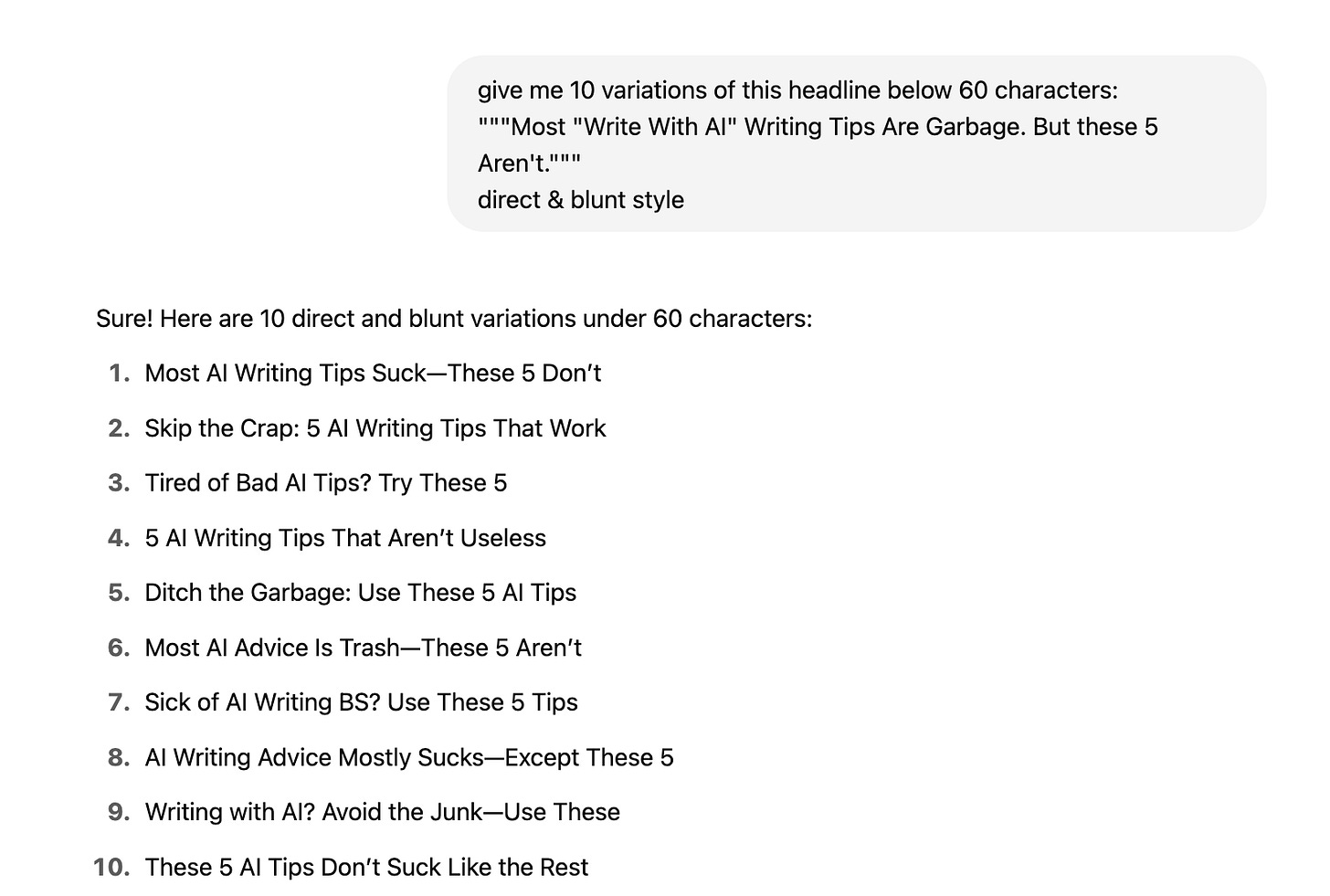Most "Write With AI" Writing Tips Are Garbage - But These 5 Aren't
Legit ways to improve your writing skills (and grow your audience faster)
So you want to write with AI, but are drowning in a collection of prompts that don't move the needle?
Let's change that.
In this article, I'll give you practical tips to write content with AI that doesn't sound like it was written by a robot pretending to be human.
I know because I've:
written close to a million words with AI myself
spent hundreds of hours trying to make it sound like me
helped 294+ clients create their own "custom-made" writing prompts
Let's get right into it.
Get more clicks on your articles
Most writers spend 90% of their writing time writing the article.
But if your headline doesn't grab attention, nobody will ever see that article you spent hours on.
That's why you want to spend time getting the headline right.
Your headline needs to:
Make a promise
Give your reader a reason to click
Be specific, intriguing, and curiosity-peaking
Call it clickbait if you want. I don't care.
I've written so many headlines that I've got a feel for it. And that's ultimately where you want to be, too. But when you're just getting started, using AI to find headline ideas can be a useful shortcut.
A simple prompt you can use is this:
give me 10 variations of this headline below 60 characters:
“””[YOUR HEADLINE GOES HERE]”””
direct & blunt styleThis prompt is simplistic, but it works. You can adjust the style to fit your voice.
I've created a comprehensive list and compiled it into a cheat sheet. You can grab it for free on this link.
PRO TIP: I usually find the best ideas by mixing and matching different variations:
Don't expect to get the perfect copy-paste headline. It's usually a patchwork.
Eliminate 97.8% of your typos
One of the best tips for writing is to not care about the typos and the red underlines.
Proofreading comes later on. You first need to get your thoughts on paper before you can edit them.
90% of the internet uses Grammarly to proofread.
It's decent. But have you ever used it? Click, click, click, click, click. For every single suggestion. It's like death by a thousand paper cuts.
After 2 minutes of this, I want to throw my laptop out the window.
With AI, I can simply paste my draft and say "proofread this" and get a revised version instantly. No clicking through endless suggestions.
Use this prompt:
# **ROLE= Proofreader**
# **INSTRUCTIONS:**
Please correct ONLY grammatical mistakes and spelling errors from the following text.
# **Here’s the text to correct:**
[YOUR ARTICLE HERE]
# **FORMATTING:**
1. Only output the corrected text, NOTHING else.
2. KEEP the SAME formatting.See if your ideas are good (or stink like rotten fish)
I've noticed a pattern when working with AI.
The quality of your output depends on the quality of your ideas. And it drives me nuts when I see people saying that they're using AI to brainstorm and find ideas.
Because you'll end up with the generic stuff everyone can get.
Instead, what I like to do is start each conversation with my own ideas that I've distilled into my second brain.
Sometimes you start with an outline. And then, as you write your article, you notice that it actually doesn't make sense.
So instead of wasting an hour writing a first draft that doesn't make sense, use AI to quickly expand on your ideas. Feed the AI with the outline. Ask it to write based on your writing style and see whether or not your ideas actually have legs.
Specificity
Your audience is drowning in content.
Every day, millions of words are pushed into the void by people (and AI.)
Most of it is ignored. Scrolled past. Forgotten.
One of the best ways to stand out is to be specific.
Talk to your reader with the same internal dialogue that's going on in their head. Then, use these words in your content.
And one of the best ways to actually do this is to ask AI to write like your audience is thinking.
How do you do that? By simply letting AI know who your audience is.
Now you can be specific on:
age
gender (only 2 – right?)
or whatever else sets your audience apart
Let's say I'm talking about something painful. I could say "It hurts."
But I could be more specific.
For men:
"It hurts like a kick in the balls."
For women:
“It hurts like cramps on day one.”
But we can go further…
For younger women (20s–30s):
“It hurts like day-one cramps during a meeting you can’t skip.”
For moms:
“It hurts like contractions.”
For perimenopausal women (late 30s–50s):
“It hurts like hot flashes and cramps.”
Got the point?
Okay, the prompt for this doesn't have to be complicated. It could be as simple as this:
help me add more specificity to this article. the reader is [DESCRIBE READER HERE].Hack your way into your reader's mind
95% of content gets zero traction.
The reason? Because creators write about what they think is interesting.
They never spend 2 minutes researching what their reader actually cares about.
Big mistake.
A better way is to learn from copywriters, who have been writing to make money for decades. Every respectful copywriter will give you this advice: talk to your target market.
But here's the tricky thing.
Sometimes you just don't know how to get your target market on the phone. So, in the past, what I would do is jump into Facebook groups, scroll Reddit, or browse through social media comments to see what people say.
All this is good, but it's a huge time suck.
AI has been trained on all the data on the internet. So you can do research that used to take 10 hours in 10 minutes.
Instead of guessing what your audience wants, have the AI respond as if it were them. I'll say something like:
"You're a 45-year-old executive who wants to start a side business but doesn't have time for social media. What are your biggest concerns about starting an online course?"
(Noticed the specificity?)
Then I take those responses and build my content around them.
You can craft anything you want out of this:
headlines
video scripts
newsletter content
social media posts
Maybe not everything is going to be valid. But this is going to be a way better approach than using your own assumptions.
If you’re smart, AI won't replace you. (But if you’re dumb, that’s another story)
Treat AI as your writing copilot.
It can help you get where you want to go faster.
As long as you know where you want to go and have the skills to get there.




Very good advice. The only way to stand out from all the background noise is to be yourself